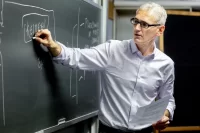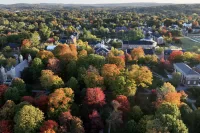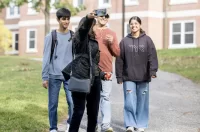
CEO of American Indian Higher Education Consortium to speak at Bates College
Carrie Billy, president and chief executive officer of the American Indian Higher Education Consortium, discusses her work at 7 p.m. Monday, Nov. 2, in the Edmund S. Muskie Archives, Bates College, 70 Campus Ave.
Sponsored by the Office of Multicultural Affairs, this event is open to the public at no cost. For more information, please call 207-786-8376. A dinner with Billy precedes the event at 5:15 p.m.; seating is limited and by RSVP only. For more information, contact this ttaylor@bates.edu.
Billy, a member of the Navajo Nation, began her second term at AIHEC in 2001. She currently oversees “American Indian Measures for Success,” a data collection initiative that seeks to define, collect and report quantitative and qualitative indicators of American Indian institutional success. She also works closely with AIHEC’s “Indigenous Evaluation Framework Initiative, “a long-term effort to develop a way to synthesize methods of indigenous and Western evaluation practices.
Billy was appointed as the first executive director of the White House Initiative of Tribal Colleges and Universities by President Bill Clinton in 1998. She coordinated a multifaceted effort to integrate tribal colleges into federal programs, facilitating large funding increases, organizing the first visit by a U.S. president to a tribal college and establishing new educational programs focusing on tribal education in several federal agencies.
“I see tremendous opportunity for the Tribal College Movement,” she says in a letter to AIHEC members. “Guided by the stories, lessons and experiences of our grandparents, we have before us many paths of possibility. Working together, in partnership with old and new friends throughout the country and the world, the various paths we take are all leading to strong sovereign nations through excellence in tribal higher education.”
AIHEC is comprised of 36 tribal colleges and universities in North America, primarily in the Midwest. Founded in 1972 by the presidents of the United States’ first six tribal colleges as an informal collaboration between institutions with similar missions, AIHEC has grown to represent both United States and Canadian institutions, united under the mission of creating sovereign nations through excellence in tribal higher education.
Bates “is committed to recruiting and retaining [Maine Native American] students,” explains Marylyn Scott, director of multicultural recruitment. “This is a population of Maine students that we have not previously tapped into, and it’s incumbent upon us to do so.”
Native American students are disproportionately enrolled in two-year colleges, and are much less likely to complete college than their non-Native American peers, according to a 2007 U.S. Senate Report.
Bates has joined Colby and Bowdoin colleges and Maine’s Maliseet, Micmac, Passamaquoddy and Penobscot tribes in the Wabanaki-Bates-Bowdoin-Colby initiative, designed to encourage tribe members to go to college. Bates has also expanded the representation of Native American interests in its cultural and curricular offerings.




